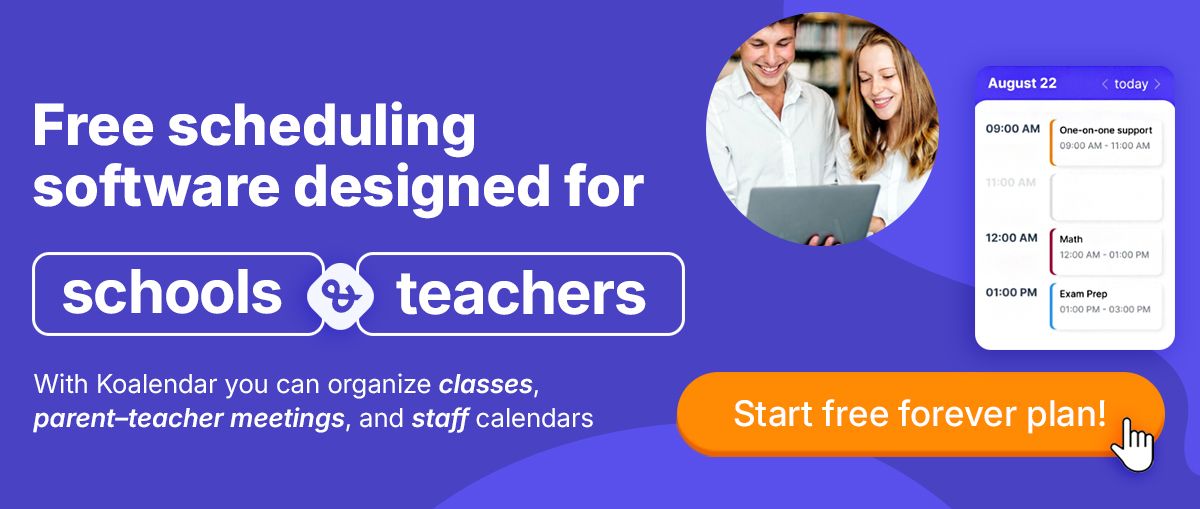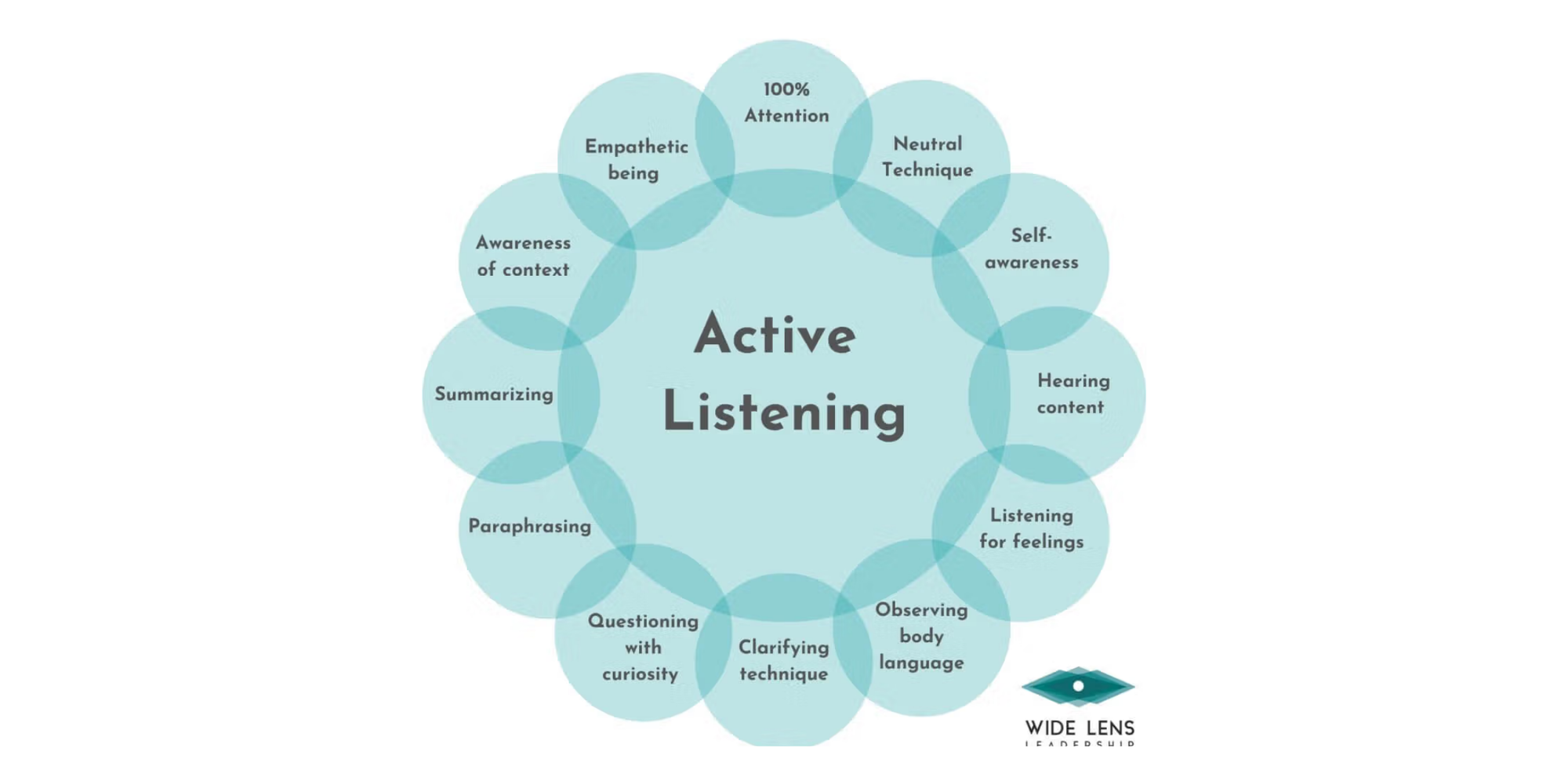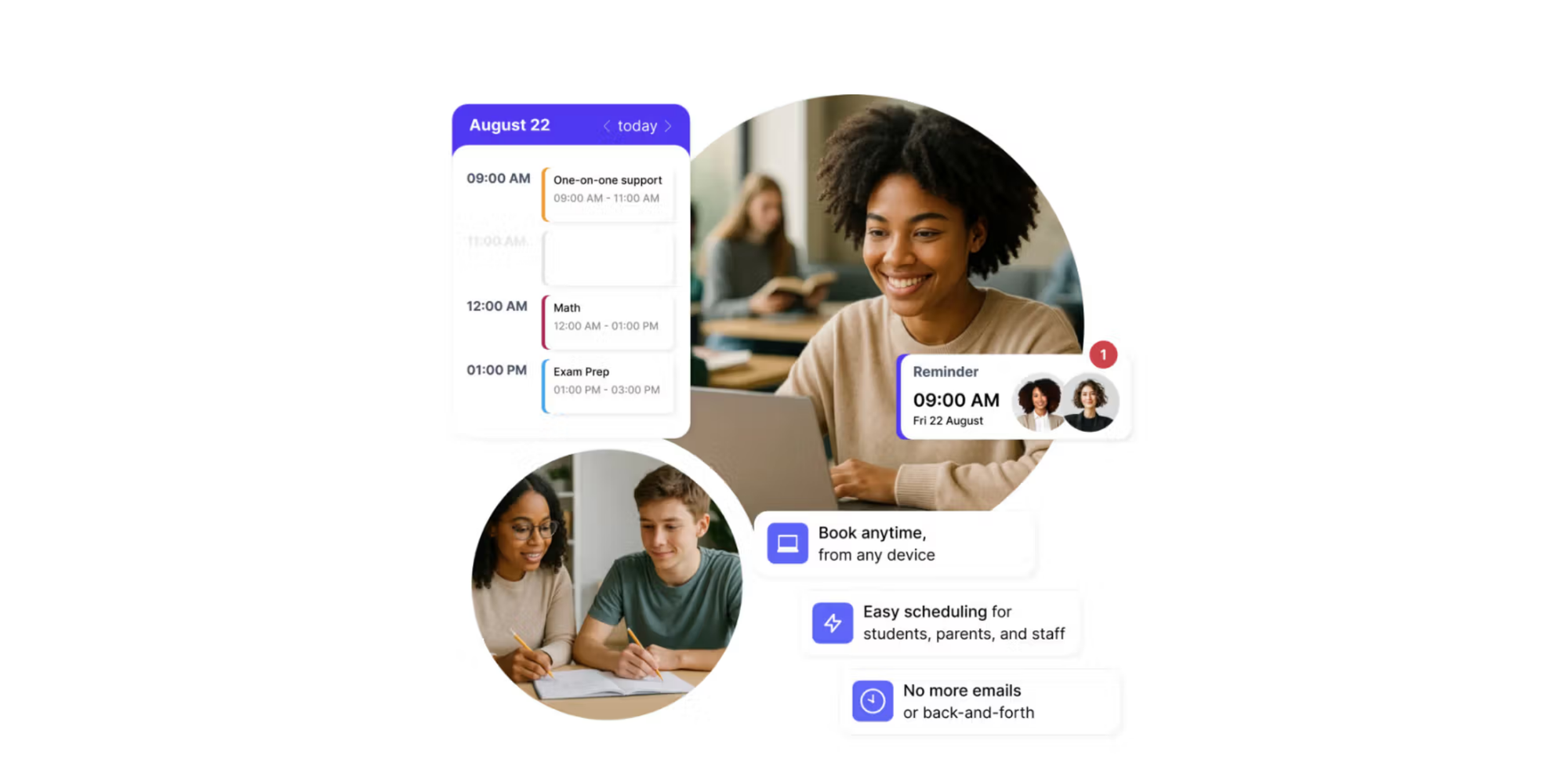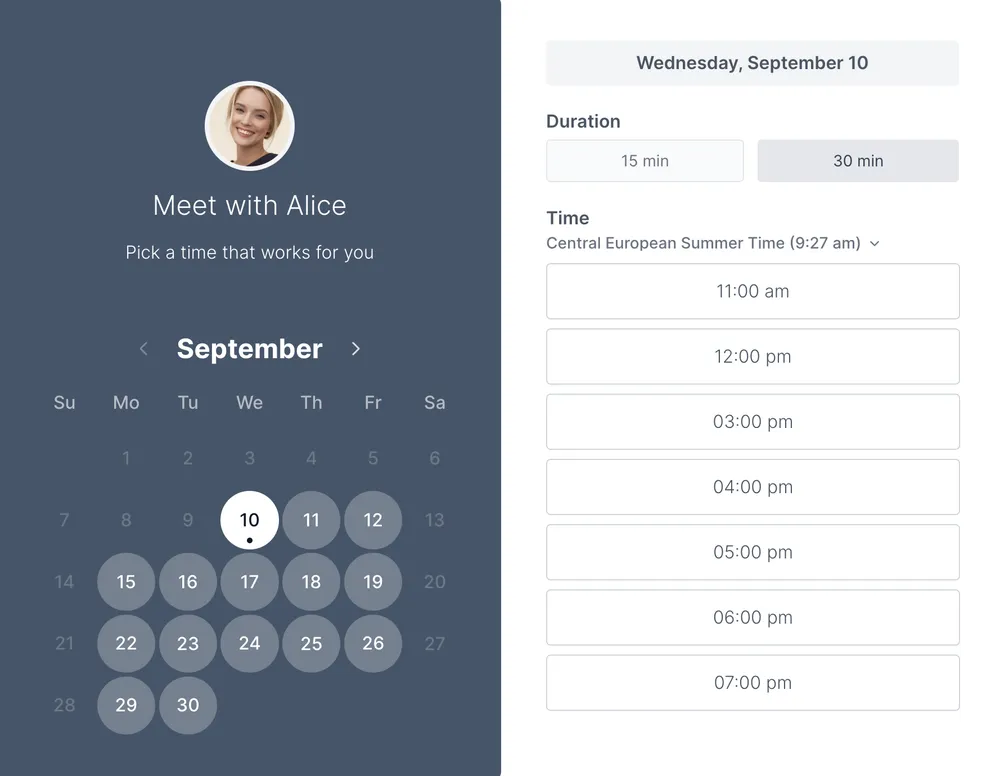Ever felt rushed during parent–teacher conferences? You’re not alone. The good news? With a simple agenda and the right tools, you can keep meetings on track and parents engaged.
Parent–teacher conferences are a cornerstone of effective education, strengthening the home–school partnership and boosting student success.
For teachers, however, it can be challenging to stay organized and on track when conducting multiple parent meetings over a single day or week.
In this guide, we share some helpful student progress meeting tips and a meeting agenda framework you can follow to run meetings that are a hit.
You’ll learn how you can:
- Save time on planning and organization.
- Reduce parent no-shows.
- Avoid scheduling conflicts.
- Develop clearer action plans and outcomes.
What is a teacher-parent conference, and why are they Important?
A teacher–parent conference (sometimes called a parent–teacher meeting, parents’ evening, educator–parent session, or family conference) is a short, focused meeting between educators and families to discuss a student’s academic progress, behavior, and overall development.
These sessions are a key part of the school schedule, and usually happen once or twice per school year, though many schools also schedule additional check-ins as needed.

At its core, a teacher–parent conference is about collaboration. Teachers bring their professional insight into a child’s learning, while parents provide context about the child’s experiences, habits, and needs at home. Together, they align on how to support the student best.
Why they matter:
- Boost academic achievement: Studies consistently show that when parents engage with their child’s education, student performance improves.
- Strengthen communication: Regular dialogue builds trust and transparency between families and schools.
- Address challenges early: Conferences allow teachers and parents to spot issues (academic or behavioral) before they escalate.
- Celebrate growth: They’re also a chance to recognize and encourage a child’s strengths, which motivates continued progress.
- Create shared goals: By setting specific targets together, both parents and teachers stay aligned on how to help the child succeed.
Think about the last time a parent shared something about your student’s home life that explained a classroom behavior. Moments like these remind us why these meetings are so valuable; they connect the dots between home and school life.
Research shows that active parent involvement in school (including conferences) correlates with higher academic achievement, motivation, and engagement.
For example, an American Psychological Association review of 448 studies found that students whose parents participate in school activities (like conferences) tend to “show higher academic achievement, school engagement, and motivation”.
Similarly, the NYC Department of Education notes that “great conferences between teachers, parents, and students can lead to improved student outcomes both inside and outside the classroom”.
In practice, about 72–75% of U.S. parents attend at least one parent–teacher meeting annually, highlighting how common and valued these sessions are. Well-planned conferences help parents understand a child’s progress and align home support with school goals, ultimately advancing student performance and engagement.
How long do parent-teacher conferences last?
Most parent–teacher sessions typically last between 10 and 20 minutes per family, depending on the school’s schedule and the student’s needs.
Shorter time slots encourage focus and efficiency, while longer sessions may be scheduled if a student requires extra support or if multiple teachers are involved.
To make the most of the limited time, teachers should prepare materials in advance and stick to a clear agenda, while also offering parents the option to schedule a follow-up meeting if more discussion is needed.
How to prepare for parent-teacher conferences: key elements
Every successful meeting shares certain core elements. To prepare for your teacher-parent conferences, produce a clear agenda and objectives in advance, ensuring that both teachers and families know what topics will be covered.

At the meeting itself, your role is to present a balanced overview of the student: highlight strengths and achievements alongside areas needing support. Provide concrete data or examples (work samples, grades, test scores, behavior logs) to ground the discussion.
Middle and Upper School Math Teacher, Crystal Frommert, recommends giving “objective feedback on student progress” while actively “listening carefully to parental concerns”.
Key elements include:
- Set a clear agenda and goals: Share the conference agenda (e.g. learning objectives, growth areas) before or at the start of the meeting. Explain classroom goals and expectations so parents can ask questions and clarify what success looks like.
- Student performance overview: Prepare to discuss grades, test scores, and formative assessments. Use charts or samples to illustrate progress over time (see next section).
- Balanced feedback: Lead with positive observations before discussing challenges.
- Be solution-oriented: Focus on how to support the student rather than just “fixing problems”.
- Two-way communication: Invite parents to share insights about their child’s learning or home context. As one expert notes, “your knowledge about your child is always going to be…so much deeper than what I know. I depend on you to tell me whatever you think is important”. During the initial scheduling, you could use a form with your meeting booking link (like Koalendar) to gather questions and documents from the parents in advance. This can also help to set the agenda and expectations for the meeting.
- Actionable next steps: End with clear action items. Identify specific strategies or goals for the student and define who will be responsible for each task (teacher, parent, or student). Consider documenting these in writing (e.g., a simple action plan).
Don’t worry if it feels like a lot; most teachers already do many of these steps without even realizing it! This framework helps you stay focused.
We suggest that you read this manual on how to communicate with parents as a teacher if you want to get more knowledge on communication and planning strategies.
Student Performance Overview
A detailed student performance overview helps parents understand where their child stands and where to focus support.
Begin by summarizing recent grades, test or quiz scores, and any relevant benchmark data (e.g. reading levels, math standards). Use clear, jargon-free language and visual aids if possible. For example, many teachers prepare simple graphs or charts showing a student’s progress over time. You don’t need fancy charts — even a simple folder with two or three examples can spark an ‘aha’ moment for parents.
Maureen Holt, a reading specialist at Humboldt Elementary School in Dewey-Humboldt, Arizona sends home “data folders containing printouts about specific skills… graphs showing how each student performed, and descriptions explaining the assessment data”.
If sharing ahead of time, add annotations or guides so parents aren’t confused by raw scores. During the conference, explain the data in context (e.g. “At this point in the year, the expected reading score is X, and your child is at Y”).
Emphasize growth and trends, not just one snapshot. Highlight areas of strength (e.g. “Your child’s writing has improved in creativity”) as well as areas for improvement (e.g. “She needs more practice with math reasoning”).
Using concrete examples – a graded test or portfolio piece – can make these points vivid. Ultimately, the goal is to give parents a clear picture of current performance and to focus on how to support continued progress.

Goals for the upcoming term
Every conference should conclude with goal-setting for the next term. Encourage both academic and behavioral goals that are specific, achievable, and actionable.
For example, decide on a reading goal (e.g. “read at least two extra chapter books before next conference”) or a behavior goal (e.g. “raise hand before speaking”). Write these down so all parties can refer to them.
One powerful technique is a “growth contract”: a simple form where the teacher, parent, and student each commit to specific actions toward a shared goal. For instance, the contract might say “Student will practice multiplication facts 20 minutes per week, Parent will quiz the student each evening, Teacher will provide extra worksheets as needed.”
By making this joint commitment, families and teachers stay aligned on helping the student improve. These goals also become benchmarks for the next student progress update.
Here are some practical examples of goals you might set during a conference:
Academic Goals
- Improve reading comprehension by practicing with a parent three nights per week.
- Raise math test average from 70% to 80% by the end of the term.
- Complete all homework assignments on time for the next four weeks.
Behavioral Goals
- Participate at least once per class by answering or asking a question.
- Stay on task during independent work for at least 15 minutes at a time.
- Use respectful language with peers and teachers throughout the school day.
Social/Emotional Goals
- Join one extracurricular activity to build confidence and teamwork.
- Practice stress‑management techniques before tests (e.g., deep breathing).
Organizational Goals
- Keep backpack and binder organized; check with parent once a week.
- Record homework daily in a planner and review it at home each evening.
Consider giving a copy of the goals to the student, too – research shows students who help set their own goals tend to be more engaged and take ownership of learning.
Best practices for conducting the conference
When the conference day arrives, how you conduct the meeting makes all the difference. Use these best practices to create a productive and positive experience:
- Time management: Start and end on time. Allocate enough time per family (typically 10–15 minutes), and have a clock or timer to stay on track. If a conversation needs more time, schedule a follow-up meeting. Using scheduling software such as Koalendar can automate reminders and reduce no-shows.
- Create a welcoming environment: Set a friendly, respectful tone. Greet parents warmly, smile, and introduce yourself and the student by name. Offer a seat and establish a relaxed space (keep a clutter-free desk, use a quiet room). Positive body language (nodding, eye contact) helps parents feel heard.
- Positive tone: Imagine starting every meeting with a genuine win — like showing a parent their child’s artwork or a math quiz where they improved. It sets the tone instantly. Begin with praise or good news about the student (even small successes). Parents appreciate hearing strengths first. One teacher’s tip: “We can all sniff out empty praise. There is always something positive… about every single child. It's your job to find it and share that data.”. Genuine positivity builds rapport and makes later discussions of challenges easier.
- Active listening: Edutopia recommends letting parents do at least one-third of the talking. Listen without interrupting. If you disagree with a parent’s view, acknowledge it respectfully and stick to facts. Paraphrase their points to ensure understanding (e.g. “So you’re saying that at home, he seems anxious when he does homework — is that right?”).
- Use precise language: Avoid jargon or technical terms (SPI, Lexile, etc.) without explanation. Translate academic terms into plain language. For example, instead of “underperforming on the LEAP test,” say “struggling with grade-level math problems.”
- Be solution-oriented: If issues arise, frame them as solvable challenges. The Edutopia “problem-solution” tips suggest focusing on what’s being done and what can be done. For instance, say “I’ve noticed Maria is often distracted during class. Here’s what I’m doing: [strategy]. At home, perhaps you could [strategy] and we can compare notes”. Avoid placing blame on parents or students.
- Maintain a collaborative voice: Use inclusive language (“we” and “our”), not accusatory words. For example, “Let’s figure out how we can help improve your child’s reading,” rather than “You need to help.”
- Prepare materials: Have all documents ready (report cards, work samples, notes). Put sticky notes on key pages. This shows organization and respect for the parents’ time.
- Equity and comfort: Remember cultural differences. If a family observes cultural norms (e.g. seating arrangements, gender roles), be mindful and respectful. Offer translated materials in advance if possible. If an interpreter will attend, allow extra time so everyone can speak without feeling rushed.

By following these practices – staying positive, listening, managing time, and speaking clearly – you create a productive and welcoming conference atmosphere.
Follow-up steps after the conference
The work doesn’t end when the clock strikes the final bell. Good follow-up ensures momentum from the conference is not lost. Here’s how to continue supporting the student after the meeting:
- Send a recap email or note: Within a day or two, email or print a summary of the conference: highlight discussed topics, reiterating goals/action items, and thanking the parents for their partnership. This gives parents a reference and reinforces commitments.
- Share an action plan: If you created goals or a “growth contract,” send a copy of it. If you agreed on specific strategies (such as extra reading minutes or math practice), write those down so both sides can remember. Consider using a shared online document or drive folder for any materials or assignments.
- Schedule check-ins: Plan to review progress. You might set short-term benchmarks (“In two weeks, we’ll see how the new reading routine is working”). You can use scheduling software (like Koalendar) to set up quick follow-up calls or meetings as needed. Automated reminders help keep everyone on track.
- Keep the communication channel open: Communication between parents and teachers is key. Invite parents to email or call with any questions or updates via the school communication tools. Some teachers schedule brief “reconferences” mid-term. According to school leaders, a simple “thank you” or progress report call to families after the conference can have a big impact. For example, one district suggests calling a few families to say “I saw your child’s improvement on X” or “next steps we discussed are underway.”
- Reflect and improve: After the evening, ask parents for feedback on the conference process (maybe a quick survey or simply a question: “How was your experience? What can we do better?”). Also, self-reflect and consider what went well or could be improved for next time.
These follow-up steps turn a one-time conference into an ongoing partnership by showing families that you are committed long-term to their child’s success and make the next parent–teacher meeting even more effective.
Tips for enhancing parent-teacher conferences
Here are some helpful tips and strategies for running effective parent-teacher conferences.
Use a conference agenda or template
To streamline preparation, use an agenda template. For example, a simple agenda might include:
- Welcome & Introductions (2 min): Greet parent/student and share positive news.
- Performance Update (5 min): Review grades, tests, behavior; show examples.
- Strengths & Areas for Growth (5 min): Highlight achievements and discuss challenges.
- Goal Setting (5 min): Agree on specific academic or behavior goals for the next term.
- Questions & Next Steps (3 min): Invite parent input, confirm action items, and thank them.
Use an appointment scheduling software
Coordinating conference times can be a big headache. Koalendar offers free scheduling software for schools that lets parents easily book conference slots online.
With Koalendar:
- Each teacher can share a personalized booking link.
- Parents pick a convenient time (including virtual vs. in-person options).
- Parents can upload documents on the meeting link.
- Parents can ask questions when accepting the meeting.
- Meetings can have a password for additional privacy.
- Automatic email/SMS reminders and calendar syncing mean fewer no-shows and less ping pong messaging to arrange a time.
- The software can also manage classroom or meeting room booking.

Alessandra Fanelli, Program Manager at Muhlenberg College, shares that using Koalendar for parent–teacher conferences “doubled our attendance rates… and attendance is up 50%”.
By combining these resources with thoughtful planning, educators can make parents' evenings at school smoother and more impactful.
Personalize the content
Educator–parent sessions should be tailored to each family and student. A one-size-fits-all approach (same script for every grade and subject) can miss key concerns or opportunities. Here are ways to personalize:
- Grade level and age: With younger kids, make it fun! Let them share a drawing or walk parents through their portfolio. It builds confidence and keeps the meeting positive. For older students, shift the focus to future planning — study skills, course choices, and what’s next after graduation. In high school, where multiple teachers may be involved, coordinate ahead so families get a clear, consistent message.
- Subject or needs: Tailor the conversation to what matters most. A math teacher might walk through a problem-solving strategy, while a language arts teacher could highlight a piece of writing that shows growth. If the student has special learning needs, address these openly and positively. With the proper adjustments—and an interpreter if needed—parents leave feeling reassured and supported.
- Cultural and language considerations: Every family should feel welcome at conferences. That may mean scheduling extra time with an interpreter, or sharing translated materials ahead of time. During the meeting, keep eye contact with parents — not just the interpreter — so they feel respected and included.
- Format (in-person vs. virtual): Some conferences may be held online. For virtual parent conferences, test the video platform in advance and ensure both sides have a clear agenda. Share digital copies of any documents or slides. If families struggle with technology, offer a quick tutorial or an in-person alternative. Embedding a reliable scheduling link can help parents choose the format they prefer.
Be attentive to each family’s circumstances. Ask parents before the meeting if there are specific concerns or preferences (“What’s the best way I can explain my class routines?” or “Is there a particular issue you want to focus on?”).
Personalizing shows respect for each student’s context and makes the conference more relevant and supportive.

Incorporate feedback and suggestions
A great conference is a conversation, not a monologue.
After presenting your insights, make room for parents to share their thoughts and contribute. You might begin by asking open-ended questions. Some example questions to ask parents could include “What do you notice about your child’s learning?” or “Do you have any questions about what we covered?”.
Listen actively and take notes on their observations. Remember, parents are experts on their child; as one Edutopia guide emphasizes, “your knowledge about your child is always going to be…deeper and more thorough than what [the teacher will] know.”
Encourage parents to suggest strategies that work at home (e.g., reading together, using math apps). Validate their feelings and concerns. If a parent raises an issue (like difficulty with homework), brainstorm solutions together (for example, adjusting homework load or creating a consistent study schedule). Where possible, change your teaching approach in response. For instance, if a student is anxious about math, you might add more one-on-one support.
At the end of the meeting, thank the parents for their input and suggest a follow-up plan for any major concerns. Involving parents in the problem-solving process builds trust and ensures that any agreed changes are realistic and supported at home.
Set the foundations for successful parent-teacher conferences
Parent–teacher conferences are a two-way partnership. Your warm, supportive approach and follow-through show families that you care about their child’s success.
With the right preparation and organization, you’ll turn each conference into a positive step forward for every student. Follow the parent-teacher conference tips in this guide and see how much better you feel after your next one!
Educator-parent conferences don’t have to feel overwhelming. With Koalendar, scheduling becomes the easy part. 👇Try our free forever plan .👇






